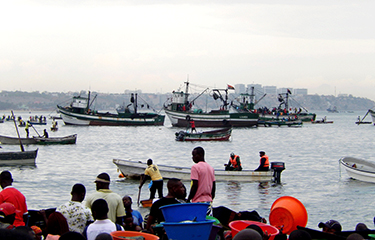Angola has reduced the annual closure of its horse mackerel fishery from three months to two in 2024, according to the country’s national fisheries director, Victor Chilamba.
The ban will be reduced to encompass just the months of June and July, when the species enters its breeding season, Chilamba announced 12 December, according to the Angola Press Agency.
Chilamba said the country’s horse mackerel stock has grown in recent years, and the move follows recommendations from the Council for Integrated Management of Aquatic Biological Resources and the Consultative Council of the Ministry of Fisheries and Marine Resources.
Angola’s fisheries agency has set a quota of 304,000 metric tons (MT) for the commercial fishery, and 186,000 MT for the artisanal fishery, with the 490,000-MT total down the 600,000-MT quota in 2023.
The agency also set a lower quota for sardinella, reducing it from 200,000 MT in 2023 to 120,000 MT in 2024.
Earlier this year, the United Nations Conference on Trade and Development (UNCTAD) announced funding to support a project to help Angola grow its fisheries and aquaculture sector to help diversify its economy and improve its food security. The EU-UNCTAD Joint Program for Angola: Train for Trade II will aim to increase Angola’s seafood exports – worth an estimated USD 81 million (EUR 74.2 million) in 2018, primarily consisting of shrimp, crab, and tuna.
UNCTAD has created a knowledge-exchange program between Angola and Vietnam’s Nha Trang University for aquaculture development, and the Angolan government has committed USD 300 million (EUR 275 million) in blue economy-related investments over the next five years, according to the organization.
“The fisheries and aquaculture sector can help Angola diversify its economy and move closer to achieving its development goals,” UNCTAD Africa Director Paul Akiwumi said.
Angola Ministry of Water Resources Planning and Statistics Study Office Director Joana Gomes said the country’s government will continue to develop programs to “ensure sustainable, inclusive economic diversification led by the private sector.”
SFT Angola is one of Angola’s largest fishing companies and expressed optimism about the potential of Angola’s seafood sector.
However, a study completed in early 2023 showed a rapid decline in horse mackerel biomass in Angola and the Angola Ministry of Fisheries announced a plan to cancel some fishing licenses in response. The decree also included a plan to convert the country’s pelagic trawl vessels equipped with on-board freezing systems to vessels equipped with refrigeration systems over the next two years, according to the Namibian. It’s unclear whether the ministry remains committed to carrying out that plan.
Photo courtesy of Save our Seas Foundation







